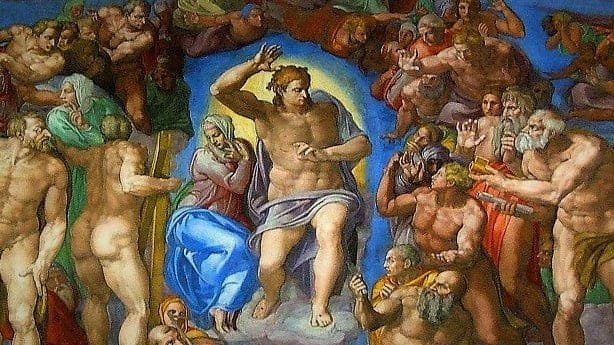DAILY GOSPEL REFLECTION. THE DESTRUCTION OF JERUSALEM (Lk 21:5–11).

Gospel of Tuesday, 34th week in Ordinary Time
Lk 21:5–11
While some people were speaking about how the temple was adorned with costly stones and votive offerings, Jesus said, “All that you see here — the days will come when there will not be left a stone upon another stone that will not be thrown down.”
Then they asked him, “Teacher, when will this happen? And what sign will there be when all these things are about to happen?” He answered, “See that you not be deceived, for many will come in my name, saying, ‘I am he,’ and ‘The time has come.’ Do not follow them! When you hear of wars and insurrections, do not be terrified; for such things must happen first, but it will not immediately be the end.” Then he said to them, “Nation will rise against nation, and kingdom against kingdom. There will be powerful earthquakes, famines, and plagues from place to place; and awesome sights and mighty signs will come from the sky.”
Gospel Commentary from the Navarre Bible, Commentary to the Gospel of St. Luke (with permission)
- 5-36 The disciples are in awe of the magnificence of the Temple, and Jesus uses the occasion to give a long discourse, known as the “eschatological discourse” because it has to do with the last days of the world. The account given here is very similar to those in the other Synoptic Gospels (cf. Mt 24:1-51; Mk 13:1-37).
- The discourse deals with three inter-connected subjects — the destruction of Jerusalem (which took place some forty years later), the end of the world and the second coming of Christ in glory and majesty.
- Jesus, who also predicts here the persecution the Church will experience, exhorts his disciples to be patient, to pray and be watchful.
- Our Lord speaks here in the style and language of prophecy, using images taken from the Old Testament; also, in this discourse prophecies which are going to be fulfilled very soon are mixed in with others which have to do with the end of the world.
- It is not our Lord’s intention to satisfy people’s curiosity about future events, but to protect them from being discouraged and scandalized about what is going to happen in the days immediately ahead. This explains why he exhorts them: “Take heed that you are not led astray” (v.8).; “do not be tempted” (v.9); “watch at all times” (v.34).
- 8 On hearing that Jerusalem is going to be destroyed, the disciples ask what sign will be given as a warning of these events (vv. 5-7).
- Jesus answers by telling them “not to be led astray,” that is to say, not to expect any warning; not to be misled by false prophets; to stay faithful to him.
- These false prophets will come along claiming to be the Messiah (“I am he!”). Our Lord’s reply in fact refers to two events, which in the Jewish mind were interrelated — the destruction of the Holy City and the end of the world. This is why he goes on to speak of both events and implies that there will be a long gap between the two; the destruction of the Temple and of Jerusalem are a kind of sign or symbol of the catastrophes which will mark the end of the world.
- 9-11 Our Lord does not want his disciples to confuse just any catastrophe — famine, earthquake, war — or even persecution with the signals of the end of the world. He exhorts them quite clearly: “Do not be tempted”, because although all this has to happen, “the end will not be at once”; in spite of difficulties of all kinds the Gospel will spread to the ends of the earth. Difficulties should not paralysed the preaching of the faith.
Dear brethren in Christ, may we live the present taking advantange of the opportunities to love God in the midst of all the current upheavals and converting all that we have in our hands into prayer and offering to God. Living in the past or in the future always leads to paralysis, waste of time, and lost opportunities. With God’s grace, if we focus to live in the present, converting all realities to love and serve God and our neighbor, we could “earn” our future. As St. Josemaria said: “Time is our treasure, the ‘money‘ with which to buy eternity” (Furrow, no. 882). A great day ahead and God bless! Fr. Rolly Arjonillo.
VIDEO COMMENTARY
Topic: WHAT SHOULD YOUR CONCERN BE AS THE WORLD EXPERIENCES UPHEAVALS, PANDEMICS AND NATURAL DISASTERS?
Today’s readings (Revelations 14:14-19 and Luke 21:5-11) and that of the days leading to Advent this coming Sunday are replete with warnings about the end of the world, the final judgment, the second coming.
Stay updated: subscribe by email for free TO OUR NEW WEBSITE www.catholicsstrivingforholiness.org (PUT YOUR EMAIL IN THE SUBSCRIBE WIDGET).
We are also in www.fb.com/Catholicsstrivingforholiness. Kindly help more people in their Christian life by liking our page and inviting your family, friends and relatives to do so as well. Thanks in advance and God bless you and your loved ones! Fr. Rolly Arjonillo


